2023届高三英语二轮复习:特殊句式 课件-(22张ppt)
文档属性
| 名称 | 2023届高三英语二轮复习:特殊句式 课件-(22张ppt) | 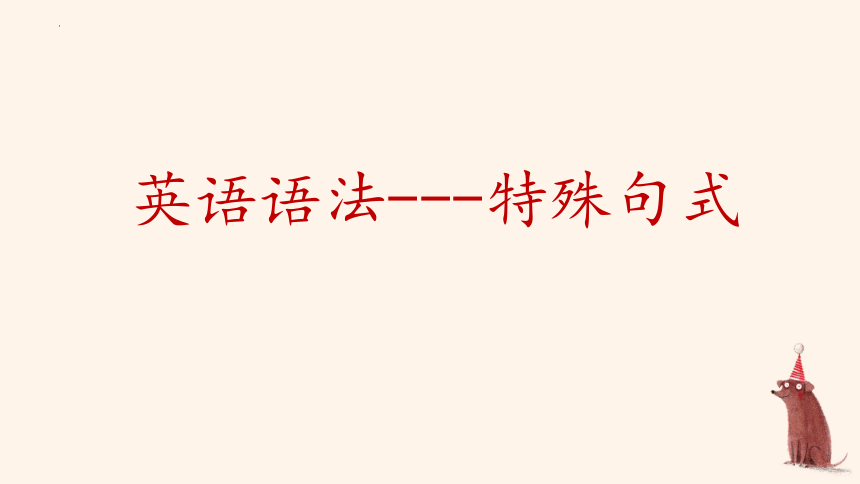 | |
| 格式 | pptx | ||
| 文件大小 | 1.6MB | ||
| 资源类型 | 教案 | ||
| 版本资源 | 通用版 | ||
| 科目 | 英语 | ||
| 更新时间 | 2022-09-26 14:45:36 | ||
图片预览

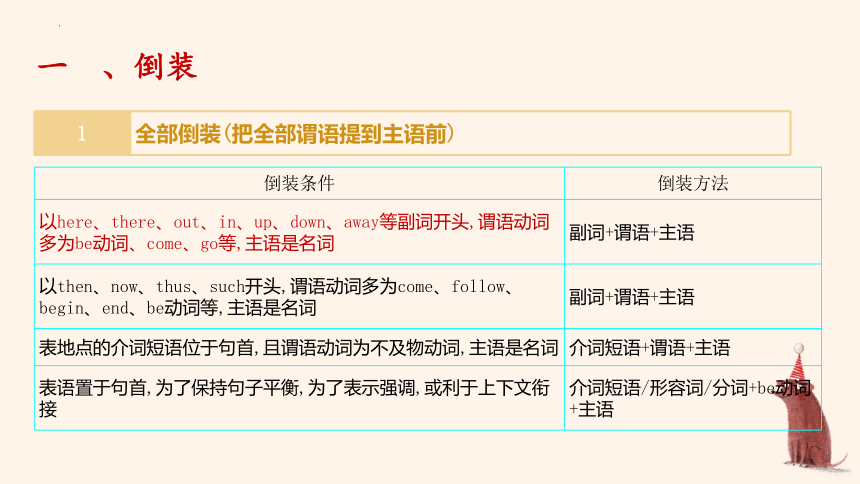

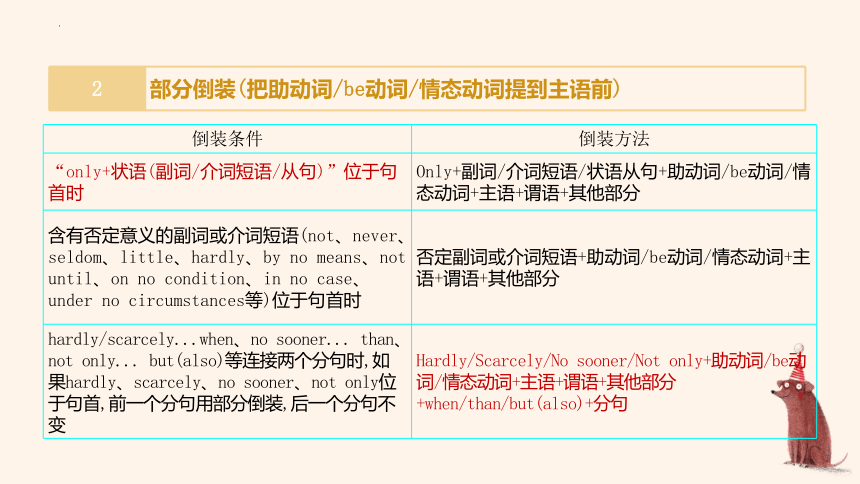
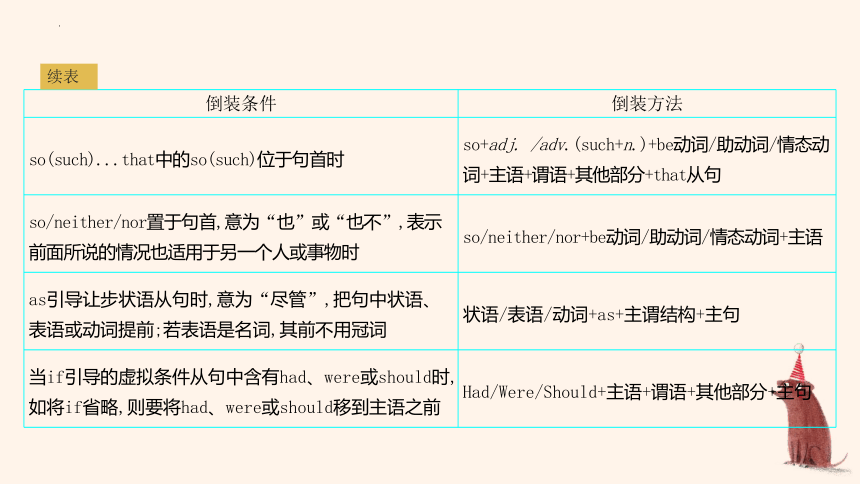
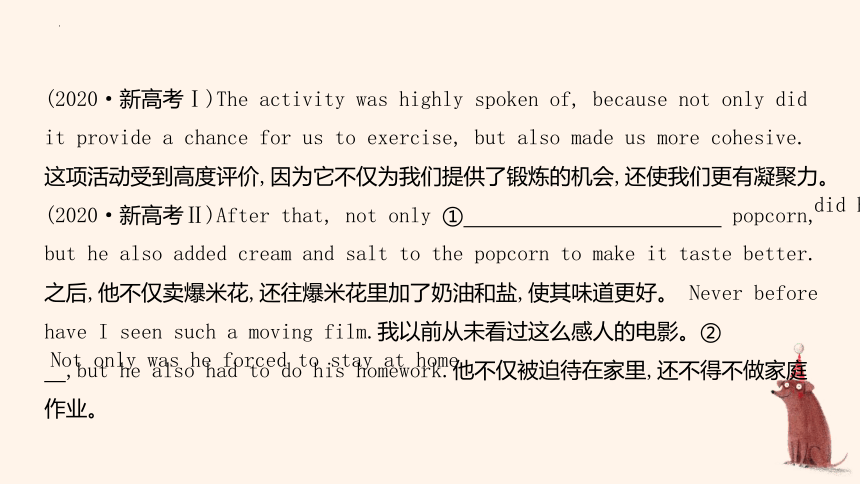
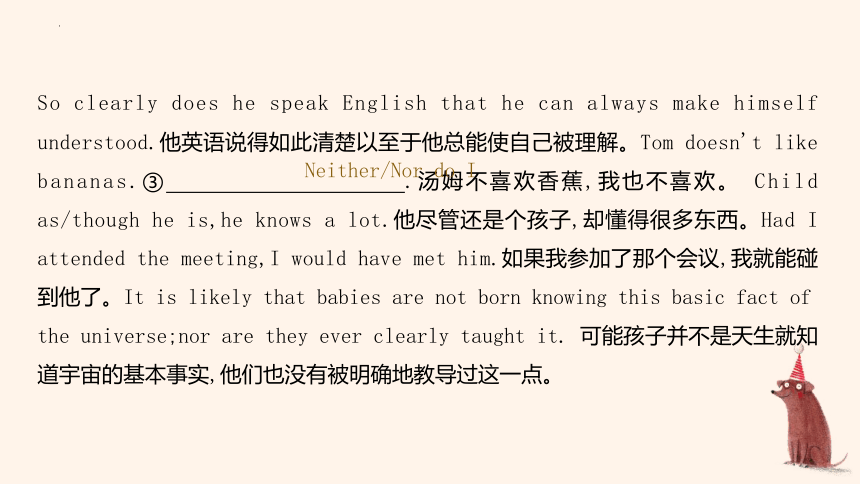
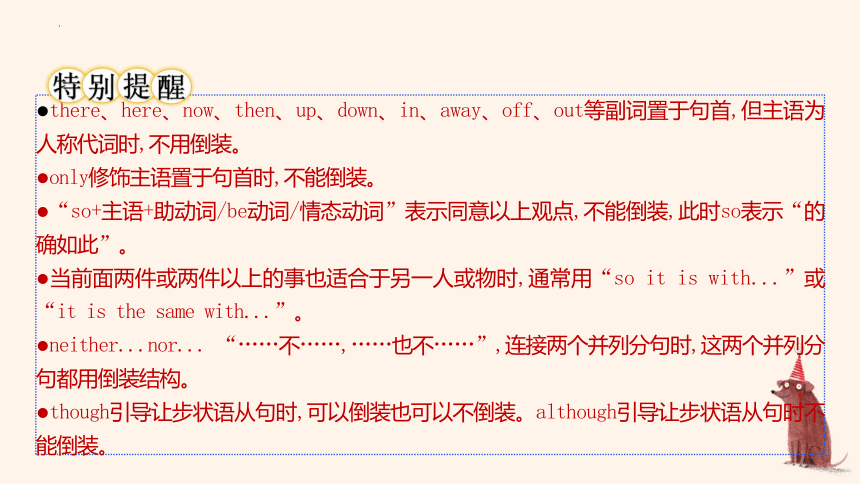
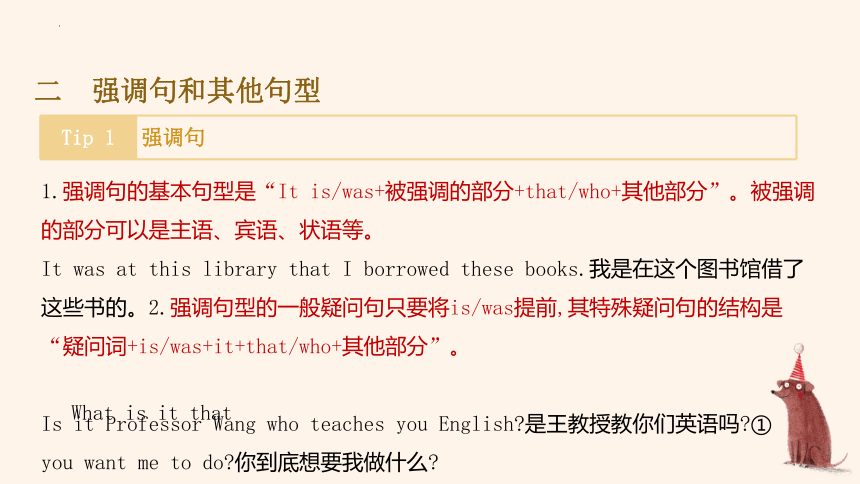
文档简介
(共22张PPT)
英语语法---特殊句式
一 、倒装
1 全部倒装(把全部谓语提到主语前)
倒装条件 倒装方法
以here、there、out、in、up、down、away等副词开头,谓语动词多为be动词、come、go等,主语是名词 副词+谓语+主语
以then、now、thus、such开头,谓语动词多为come、follow、begin、end、be动词等,主语是名词 副词+谓语+主语
表地点的介词短语位于句首,且谓语动词为不及物动词,主语是名词 介词短语+谓语+主语
表语置于句首,为了保持句子平衡,为了表示强调,或利于上下文衔接 介词短语/形容词/分词+be动词+主语
(2021·北京)There ① (be) a dramatic rise in the number of extreme weather events over the past 20 years. 过去20年里,极端天气事件的数量急剧增加。 Such was Albert Einstein,a simple but great scientist.这就是爱因斯坦,一位简单又伟大的科学家。In a lecture hall of a university in England ② .一位教授坐在英国的一所大学的演讲厅里。 Seated in the first line are some workers.坐在第一排的是一些工人。
has been
sat a professor
2 部分倒装(把助动词/be动词/情态动词提到主语前)
倒装条件 倒装方法
“only+状语(副词/介词短语/从句)”位于句首时 Only+副词/介词短语/状语从句+助动词/be动词/情态动词+主语+谓语+其他部分
含有否定意义的副词或介词短语(not、never、seldom、little、hardly、by no means、not until、on no condition、in no case、under no circumstances等)位于句首时 否定副词或介词短语+助动词/be动词/情态动词+主语+谓语+其他部分
hardly/scarcely...when、no sooner... than、not only... but(also)等连接两个分句时,如果hardly、scarcely、no sooner、not only位于句首,前一个分句用部分倒装,后一个分句不变 Hardly/Scarcely/No sooner/Not only+助动词/be动词/情态动词+主语+谓语+其他部分+when/than/but(also)+分句
倒装条件 倒装方法
so(such)...that中的so(such)位于句首时 so+adj. /adv.(such+n.)+be动词/助动词/情态动词+主语+谓语+其他部分+that从句
so/neither/nor置于句首,意为“也”或“也不”,表示前面所说的情况也适用于另一个人或事物时 so/neither/nor+be动词/助动词/情态动词+主语
as引导让步状语从句时,意为“尽管”,把句中状语、表语或动词提前;若表语是名词,其前不用冠词 状语/表语/动词+as+主谓结构+主句
当if引导的虚拟条件从句中含有had、were或should时,如将if省略,则要将had、were或should移到主语之前 Had/Were/Should+主语+谓语+其他部分+主句
续表
(2020·新高考Ⅰ)The activity was highly spoken of, because not only did it provide a chance for us to exercise, but also made us more cohesive.这项活动受到高度评价,因为它不仅为我们提供了锻炼的机会,还使我们更有凝聚力。(2020·新高考Ⅱ)After that, not only ① popcorn, but he also added cream and salt to the popcorn to make it taste better. 之后,他不仅卖爆米花,还往爆米花里加了奶油和盐,使其味道更好。 Never before have I seen such a moving film.我以前从未看过这么感人的电影。② ,but he also had to do his homework.他不仅被迫待在家里,还不得不做家庭作业。
did he sell
Not only was he forced to stay at home
So clearly does he speak English that he can always make himself understood.他英语说得如此清楚以至于他总能使自己被理解。Tom doesn't like bananas.③ .汤姆不喜欢香蕉,我也不喜欢。 Child as/though he is,he knows a lot.他尽管还是个孩子,却懂得很多东西。Had I attended the meeting,I would have met him.如果我参加了那个会议,我就能碰到他了。It is likely that babies are not born knowing this basic fact of the universe;nor are they ever clearly taught it. 可能孩子并不是天生就知道宇宙的基本事实,他们也没有被明确地教导过这一点。
Neither/Nor do I
●there、here、now、then、up、down、in、away、off、out等副词置于句首,但主语为人称代词时,不用倒装。
●only修饰主语置于句首时,不能倒装。
●“so+主语+助动词/be动词/情态动词”表示同意以上观点,不能倒装,此时so表示“的确如此”。
●当前面两件或两件以上的事也适合于另一人或物时,通常用“so it is with...”或“it is the same with...”。
●neither...nor... “……不……,……也不……”,连接两个并列分句时,这两个并列分句都用倒装结构。
●though引导让步状语从句时,可以倒装也可以不倒装。although引导让步状语从句时不能倒装。
特
别
提
醒
二 强调句和其他句型
Tip 1 强调句
1.强调句的基本句型是“It is/was+被强调的部分+that/who+其他部分”。被强调的部分可以是主语、宾语、状语等。
It was at this library that I borrowed these books.我是在这个图书馆借了这些书的。2.强调句型的一般疑问句只要将is/was提前,其特殊疑问句的结构是“疑问词+is/was+it+that/who+其他部分”。
Is it Professor Wang who teaches you English 是王教授教你们英语吗 ① you want me to do 你到底想要我做什么
What is it that
3.如果原句中含有“not...until...”,在强调时间状语时,将主句中的否定词not连同状语一起提前。
(2021·天津) It was not until I followed this feeling to its source that I discovered I had a passion for writing.直到我跟随这种感觉找到了它的源头,我才发现我对写作有了热情。4.“It is... that... ”结构不能强调谓语动词。如果需要强调谓语动词,则用“do/does/ did+动词原形”,以加强语气,意为“的确;真的;务必”。
He ② that he would help me. 他的确说过他会帮我。
did say
强调谓语动词,用“do/does/did+动词原形”。该结构只用于肯定句,并且只有一般现在时和一般过去时。
In that way, World Read Aloud Day does help make a difference.通过那种方式,世界大声读书日的确产生了影响。
特
别
提
醒
Tip 2 省略句
1.在when、while、whenever、till、as soon as、if、unless、as if、though、as等引导的状语从句中,若谓语部分含有be动词,而从句的主语又与主句的主语一致或从句的主语是it时,从句的主语和be动词常被省略。Film has a much shorter history,especially when (it is) compared to such art forms as music and painting. 电影有一段更为短暂的历史,尤其是与音乐和绘画等这些艺术形式相比较时。If (it is) necessary, we shall send a telegram home.如有必要,我们就往家里打电报。
2.不定式中的动词省略时,单独使用不定式符号to。(1)不定式中的动词被省略时,其符号to常用在be afraid/glad/happy、expect、forget、hope、intend、like、love、mean、prefer、refuse、seem、try、want、wish等的后面。I asked him to see the film,but he didn't want to (see it).我叫他去看电影,但他不想去。—Will you join in the game 你会参加这个比赛吗 —I'd be glad to (join it).我很高兴(参加)。(2)如果不定式中含有be、have或have been,通常将其保留。—Are you a sailor 你是一名水手吗 —No,but I used to be (a sailor).不是,但我曾经是。
3 祈使句
祈使句的常考句式:
(1)祈使句+and+简单句,表示“如果……就……”。(2)祈使句+or/otherwise+简单句,表示“……否则……”。Bring the flowers into a warm room and they'll soon open.将花放到暖和的房间里,它们将会很快开放。Don't drive so fast or/otherwise you'll have an accident.不要开那么快,否则你会出事的。
4 反义疑问句
反义疑问句由两部分构成:前一部分用陈述句形式,后一部分是一个简短问句。陈述部分用肯定形式时,反义疑问句部分用否定形式,反之亦然。反义疑问句部分的动词形式及主语由陈述句决定,而且主语必须是代词。1.陈述部分的主语是名词时,反义疑问句的主语用相应的人称代词。Your parents had a long talk with you last night, didn't they 你父母昨晚跟你谈了很久,不是吗 2.陈述部分主语是表示人的不定代词时,反义疑问句的主语侧重全部用they,侧重个体用he。No one was there that day, was he / were they 那天没有人在那里,是吗
3.陈述部分主语是表示物的不定代词时,反义疑问句的主语用it。Everything that he says is true, isn't it 他说的每件事都是真的,不是吗 4.陈述部分的主语是one时,反义疑问句的主语在正式的场合用one,在非正式场合用you。One should be honest, shouldn't one / you 一个人应该诚实,不是吗 5.陈述部分主语是指示代词时,反义疑问句的主语要用it或they。This is your car, isn't it 这是你的车,不是吗 Those are grapes, aren't they 这些是葡萄,不是吗
6.陈述部分是there be结构时,反义疑问句仍用there。There was a hospital, wasn't there 那儿以前有个医院,不是吗 7.陈述部分有表示推测的情态动词must时,反义疑问句的动词与must后的动词一致。They must be sleeping then, weren't they 他们那时一定在睡觉,不是吗
must后接完成式,若表示对过去情况的推测,反义疑问句中动词用didn’t;若表示对已完成情况的推测,用haven’t或hasn’t。
特
别
提
醒
8.陈述部分含有否定词时,反义疑问句用肯定式。He is never late for school, is he 他上学从不迟到,是吗 They seldom clean the room, do they 他们很少打扫房间,是吗
常见的否定词有no、never、nothing、nowhere、rarely、hardly、seldom、few、little等;若陈述部分有带否定意义词缀的派生词,如dislike、useless、unfair等,后面的反义疑问句仍用否定式。
特
别
提
醒
提升训练
1.It is our creative spirit, our visionary sense of freshnes, has been our strength for centuries. 2.But like all performances, there (be) moments when things go wrong. 3.Stand over there you'll be able to see it better. 4.In Samarkand, Mr Bissell admires the architectural wonders, while on his way to Bukhara he gets a taste of police methods when (suspect)of drug dealing. 5.The professor warned the students that on no account they use mobile phones in his class.
that
are
and
suspected
should
6.Not until recently (do) they encourage the development of tourist-related activities in the rural areas. 7.It was last Saturday we visited the History Museum. 8.When (return) home, I met my old friend Paul in the street. 9.I won't go to the party tonight even if (invite). 10.Not only (be) I interested in photography, but I take a course at university.
did
that
returning
invited
am
Thank you for listening !
英语语法---特殊句式
一 、倒装
1 全部倒装(把全部谓语提到主语前)
倒装条件 倒装方法
以here、there、out、in、up、down、away等副词开头,谓语动词多为be动词、come、go等,主语是名词 副词+谓语+主语
以then、now、thus、such开头,谓语动词多为come、follow、begin、end、be动词等,主语是名词 副词+谓语+主语
表地点的介词短语位于句首,且谓语动词为不及物动词,主语是名词 介词短语+谓语+主语
表语置于句首,为了保持句子平衡,为了表示强调,或利于上下文衔接 介词短语/形容词/分词+be动词+主语
(2021·北京)There ① (be) a dramatic rise in the number of extreme weather events over the past 20 years. 过去20年里,极端天气事件的数量急剧增加。 Such was Albert Einstein,a simple but great scientist.这就是爱因斯坦,一位简单又伟大的科学家。In a lecture hall of a university in England ② .一位教授坐在英国的一所大学的演讲厅里。 Seated in the first line are some workers.坐在第一排的是一些工人。
has been
sat a professor
2 部分倒装(把助动词/be动词/情态动词提到主语前)
倒装条件 倒装方法
“only+状语(副词/介词短语/从句)”位于句首时 Only+副词/介词短语/状语从句+助动词/be动词/情态动词+主语+谓语+其他部分
含有否定意义的副词或介词短语(not、never、seldom、little、hardly、by no means、not until、on no condition、in no case、under no circumstances等)位于句首时 否定副词或介词短语+助动词/be动词/情态动词+主语+谓语+其他部分
hardly/scarcely...when、no sooner... than、not only... but(also)等连接两个分句时,如果hardly、scarcely、no sooner、not only位于句首,前一个分句用部分倒装,后一个分句不变 Hardly/Scarcely/No sooner/Not only+助动词/be动词/情态动词+主语+谓语+其他部分+when/than/but(also)+分句
倒装条件 倒装方法
so(such)...that中的so(such)位于句首时 so+adj. /adv.(such+n.)+be动词/助动词/情态动词+主语+谓语+其他部分+that从句
so/neither/nor置于句首,意为“也”或“也不”,表示前面所说的情况也适用于另一个人或事物时 so/neither/nor+be动词/助动词/情态动词+主语
as引导让步状语从句时,意为“尽管”,把句中状语、表语或动词提前;若表语是名词,其前不用冠词 状语/表语/动词+as+主谓结构+主句
当if引导的虚拟条件从句中含有had、were或should时,如将if省略,则要将had、were或should移到主语之前 Had/Were/Should+主语+谓语+其他部分+主句
续表
(2020·新高考Ⅰ)The activity was highly spoken of, because not only did it provide a chance for us to exercise, but also made us more cohesive.这项活动受到高度评价,因为它不仅为我们提供了锻炼的机会,还使我们更有凝聚力。(2020·新高考Ⅱ)After that, not only ① popcorn, but he also added cream and salt to the popcorn to make it taste better. 之后,他不仅卖爆米花,还往爆米花里加了奶油和盐,使其味道更好。 Never before have I seen such a moving film.我以前从未看过这么感人的电影。② ,but he also had to do his homework.他不仅被迫待在家里,还不得不做家庭作业。
did he sell
Not only was he forced to stay at home
So clearly does he speak English that he can always make himself understood.他英语说得如此清楚以至于他总能使自己被理解。Tom doesn't like bananas.③ .汤姆不喜欢香蕉,我也不喜欢。 Child as/though he is,he knows a lot.他尽管还是个孩子,却懂得很多东西。Had I attended the meeting,I would have met him.如果我参加了那个会议,我就能碰到他了。It is likely that babies are not born knowing this basic fact of the universe;nor are they ever clearly taught it. 可能孩子并不是天生就知道宇宙的基本事实,他们也没有被明确地教导过这一点。
Neither/Nor do I
●there、here、now、then、up、down、in、away、off、out等副词置于句首,但主语为人称代词时,不用倒装。
●only修饰主语置于句首时,不能倒装。
●“so+主语+助动词/be动词/情态动词”表示同意以上观点,不能倒装,此时so表示“的确如此”。
●当前面两件或两件以上的事也适合于另一人或物时,通常用“so it is with...”或“it is the same with...”。
●neither...nor... “……不……,……也不……”,连接两个并列分句时,这两个并列分句都用倒装结构。
●though引导让步状语从句时,可以倒装也可以不倒装。although引导让步状语从句时不能倒装。
特
别
提
醒
二 强调句和其他句型
Tip 1 强调句
1.强调句的基本句型是“It is/was+被强调的部分+that/who+其他部分”。被强调的部分可以是主语、宾语、状语等。
It was at this library that I borrowed these books.我是在这个图书馆借了这些书的。2.强调句型的一般疑问句只要将is/was提前,其特殊疑问句的结构是“疑问词+is/was+it+that/who+其他部分”。
Is it Professor Wang who teaches you English 是王教授教你们英语吗 ① you want me to do 你到底想要我做什么
What is it that
3.如果原句中含有“not...until...”,在强调时间状语时,将主句中的否定词not连同状语一起提前。
(2021·天津) It was not until I followed this feeling to its source that I discovered I had a passion for writing.直到我跟随这种感觉找到了它的源头,我才发现我对写作有了热情。4.“It is... that... ”结构不能强调谓语动词。如果需要强调谓语动词,则用“do/does/ did+动词原形”,以加强语气,意为“的确;真的;务必”。
He ② that he would help me. 他的确说过他会帮我。
did say
强调谓语动词,用“do/does/did+动词原形”。该结构只用于肯定句,并且只有一般现在时和一般过去时。
In that way, World Read Aloud Day does help make a difference.通过那种方式,世界大声读书日的确产生了影响。
特
别
提
醒
Tip 2 省略句
1.在when、while、whenever、till、as soon as、if、unless、as if、though、as等引导的状语从句中,若谓语部分含有be动词,而从句的主语又与主句的主语一致或从句的主语是it时,从句的主语和be动词常被省略。Film has a much shorter history,especially when (it is) compared to such art forms as music and painting. 电影有一段更为短暂的历史,尤其是与音乐和绘画等这些艺术形式相比较时。If (it is) necessary, we shall send a telegram home.如有必要,我们就往家里打电报。
2.不定式中的动词省略时,单独使用不定式符号to。(1)不定式中的动词被省略时,其符号to常用在be afraid/glad/happy、expect、forget、hope、intend、like、love、mean、prefer、refuse、seem、try、want、wish等的后面。I asked him to see the film,but he didn't want to (see it).我叫他去看电影,但他不想去。—Will you join in the game 你会参加这个比赛吗 —I'd be glad to (join it).我很高兴(参加)。(2)如果不定式中含有be、have或have been,通常将其保留。—Are you a sailor 你是一名水手吗 —No,but I used to be (a sailor).不是,但我曾经是。
3 祈使句
祈使句的常考句式:
(1)祈使句+and+简单句,表示“如果……就……”。(2)祈使句+or/otherwise+简单句,表示“……否则……”。Bring the flowers into a warm room and they'll soon open.将花放到暖和的房间里,它们将会很快开放。Don't drive so fast or/otherwise you'll have an accident.不要开那么快,否则你会出事的。
4 反义疑问句
反义疑问句由两部分构成:前一部分用陈述句形式,后一部分是一个简短问句。陈述部分用肯定形式时,反义疑问句部分用否定形式,反之亦然。反义疑问句部分的动词形式及主语由陈述句决定,而且主语必须是代词。1.陈述部分的主语是名词时,反义疑问句的主语用相应的人称代词。Your parents had a long talk with you last night, didn't they 你父母昨晚跟你谈了很久,不是吗 2.陈述部分主语是表示人的不定代词时,反义疑问句的主语侧重全部用they,侧重个体用he。No one was there that day, was he / were they 那天没有人在那里,是吗
3.陈述部分主语是表示物的不定代词时,反义疑问句的主语用it。Everything that he says is true, isn't it 他说的每件事都是真的,不是吗 4.陈述部分的主语是one时,反义疑问句的主语在正式的场合用one,在非正式场合用you。One should be honest, shouldn't one / you 一个人应该诚实,不是吗 5.陈述部分主语是指示代词时,反义疑问句的主语要用it或they。This is your car, isn't it 这是你的车,不是吗 Those are grapes, aren't they 这些是葡萄,不是吗
6.陈述部分是there be结构时,反义疑问句仍用there。There was a hospital, wasn't there 那儿以前有个医院,不是吗 7.陈述部分有表示推测的情态动词must时,反义疑问句的动词与must后的动词一致。They must be sleeping then, weren't they 他们那时一定在睡觉,不是吗
must后接完成式,若表示对过去情况的推测,反义疑问句中动词用didn’t;若表示对已完成情况的推测,用haven’t或hasn’t。
特
别
提
醒
8.陈述部分含有否定词时,反义疑问句用肯定式。He is never late for school, is he 他上学从不迟到,是吗 They seldom clean the room, do they 他们很少打扫房间,是吗
常见的否定词有no、never、nothing、nowhere、rarely、hardly、seldom、few、little等;若陈述部分有带否定意义词缀的派生词,如dislike、useless、unfair等,后面的反义疑问句仍用否定式。
特
别
提
醒
提升训练
1.It is our creative spirit, our visionary sense of freshnes, has been our strength for centuries. 2.But like all performances, there (be) moments when things go wrong. 3.Stand over there you'll be able to see it better. 4.In Samarkand, Mr Bissell admires the architectural wonders, while on his way to Bukhara he gets a taste of police methods when (suspect)of drug dealing. 5.The professor warned the students that on no account they use mobile phones in his class.
that
are
and
suspected
should
6.Not until recently (do) they encourage the development of tourist-related activities in the rural areas. 7.It was last Saturday we visited the History Museum. 8.When (return) home, I met my old friend Paul in the street. 9.I won't go to the party tonight even if (invite). 10.Not only (be) I interested in photography, but I take a course at university.
did
that
returning
invited
am
Thank you for listening !
